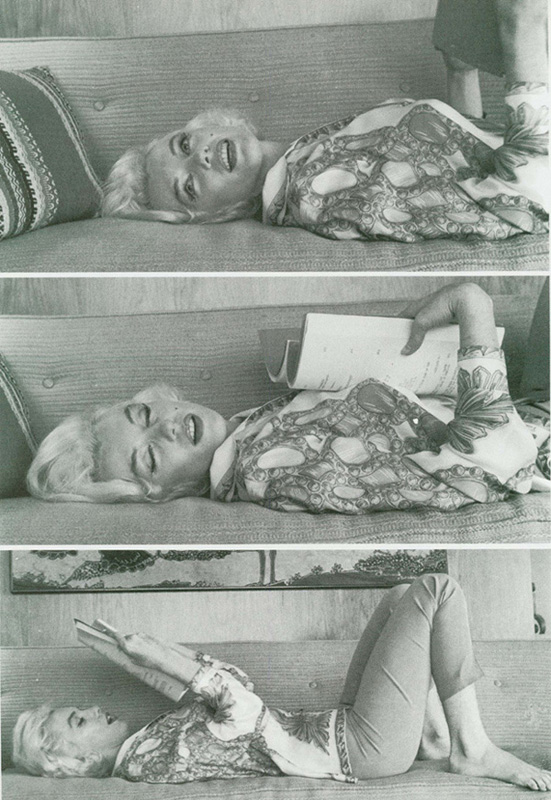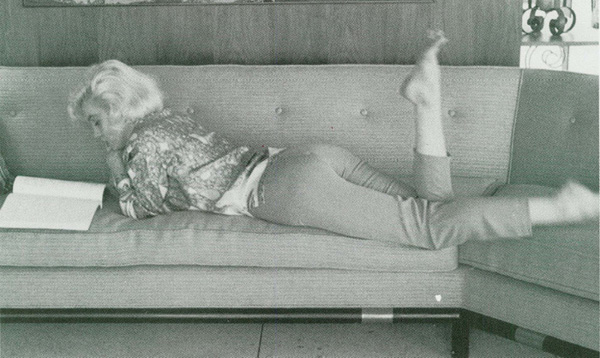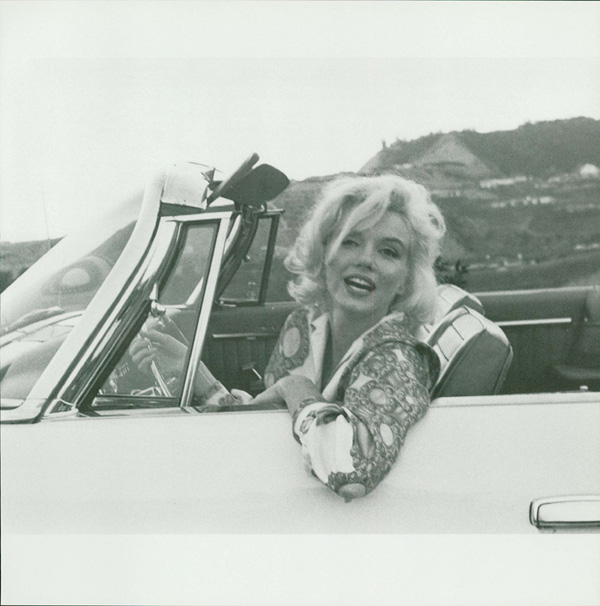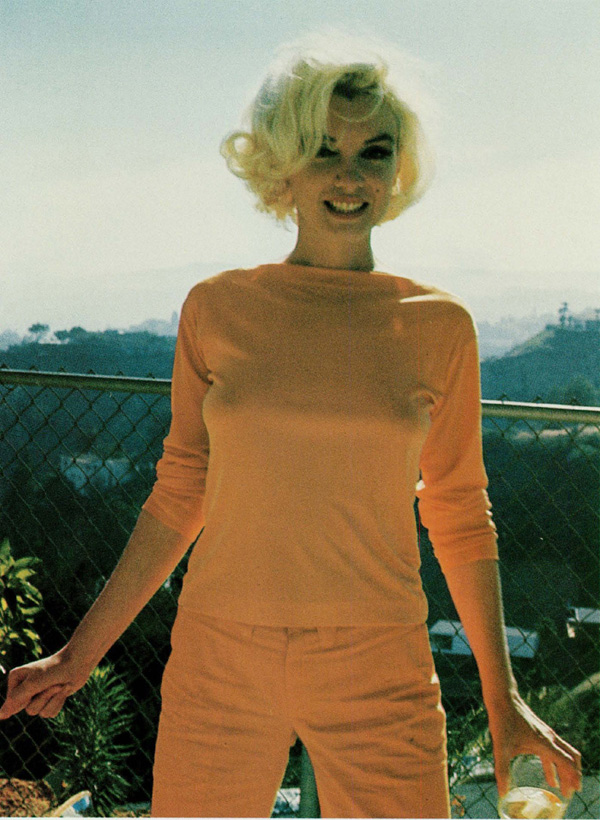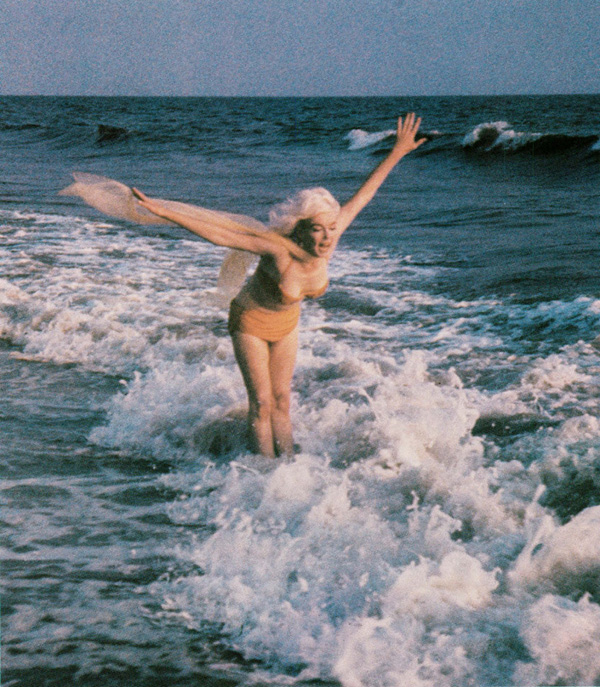10

“I’M FINALLY OUT OF SIXTY-SECOND SCENES”
What happened to me because of [that] sixty seconds in the Marx Brothers film, Love Happy, could only happen in Hollywood. Imagine, Lester Cowan, the producer, made me a star of that film even though I had only one scene and one line. I was sent to some of the larger cities in the country on a personal appearance tour for five weeks.
I felt guilty when I appeared on the stage of those movie houses billed as the star. It really was embarrassing. I had never traveled like this. For the first time I lived the life of a big Hollywood movie star, which I certainly was not. In all these cities I had press interviews, my picture in the newspapers. I appeared on television, on the radio, and, while in New York my photographer friend André de Dienes, who was working there then, took me to Jones Beach. He took pictures of me. It was fun and relaxing from the mad pace of interviews for the movie.
After those hectic five weeks, it was like Cinderella after the ball. I was back in Hollywood, wondering where or when my next film role would be offered to me. Nothing happened for some time.
Then that old screen test came to my rescue once more. Someone accidentally sent my color screen test over to Metro-Goldwyn-Mayer studios, along with others they had requested. I was excited.
They didn’t have any part for me in their films then, but one of their casting agents, Lucille Ryman, told me what I’d always wanted to hear. Miss Ryman said I had talent as an actress. Up to then no one had told me this. She told me to count on her as a friend. Can you imagine! This was music to my ears.
GEORGE BARRIS: In 1948, Marilyn auditioned in front of producer Arthur Hornblow Jr. and director John Huston for a part in their film Asphalt Jungle. She tried out for the role of Angela Phinlay, mistress to a crooked lawyer. At first she did not win the part, but then boyfriend Johnny Hyde was influential in getting her a second, successful chance. Her portrayal brought her good though brief critical notice.
It was interesting to observe Marilyn’s body language when she studied a script. A wide variety of facial and vocal techniques were at her beck and call. Here are some characteristic techniques she might employ.
Marilyn would start out lying on her back quite calmly, which appeared to be a most relaxing way for her to study her script. She would hold the script high over her head, then against her body. She would raise one foot as high as she could, relaxing the other with her knee bent. She would turn her head from side to side, sometimes closing her eyes as if in a deep sleep.
She might kneel on all fours, like a cat ready to pounce, looking down at her script as if she were ready to attack. She would assume this position when she was reading a dramatic part, rocking herself back and forth.
She proved a wonderful person. She let me live with her so that I wouldn’t have to worry about modeling or making the casting rounds. Now, because of her, I was able to study my dramatics, singing, and dancing without any worries. I felt I had a guardian angel looking after me. I was sure it was my aunt Ana, may God bless her.
Nothing much happened for a while, until Miss Ryman told me she had just finished reading a script that her studio was making into a movie. It was called Asphalt Jungle. She felt there was a part in it for me that might skyrocket my career. She told a wonderful guy named Johnny Hyde, vice president of the top Hollywood talent agency, William Morris, about this, and he agreed to take me over to the studio to meet the producer, Arthur Hornblow, and the director, John Huston.
Mr. Huston said I looked right for the part and gave me the script to study. No, I didn’t have the part yet. He suggested I come back when I thought I was ready to audition the scene of the girl in the story, Angela. The day I returned to Mr. Huston’s
From a position on the couch with the script on the floor, laughing and giggling, she might become hysterical if the scene depicted a humorous or fantastic event.
Marilyn would often try to dig deep down into her subconscious for some past event that would relate to the character she had to portray. This would help her to convey the emotional content needed for that character and scene. As she took on thephysical aspect of the character she was portraying, her voice would even change. One moment she would yell, then laugh, then cry, even sing.
In 1949, Marilyn landed the small part of Miss Caswell in All About Eve, one of Hollywood’s finest films ever. Beautifully playing a girl who would do anything to get ahead, her performance won her a new contract at Twentieth Century-Fox, and a rapid succession of roles were to follow.
She was increasingly noticed in the press, whose importance to her career she recognized. “You’ve got to see that they put your name and picture before your fans so that they don’t forget you,” she once told me. She liked most reporters and photographers, but she distrusted the ones she called “mud-slingers,” those who searched out embarrassing gossip and scandals.
But the few she truly trusted became her loyal friends for life. One of these was Sidney Skolsky, a New York press agent and columnist who fell in love with Hollywood and its stars and made himself a home in California, setting up his “office” in the famous Schwab’s Drugstore on Sunset Boulevard. During Marilyn’s early days in Hollywood, Skolsky would let her know when he heard of a part being cast that he thought would suit her. He would talk her up to the studio, and if he could convince those in charge to see her, he would phone her to let her know.
Thanks to Sidney’s persuasive ways, he was able to talk R.K.O. producer Jerry Wald into considering Marilyn for the part of a sex-wild girl named Peggy in Wald’s next film, Clash by Night. Skolsky suggested to Marilyn that she wear her sexiest dress to
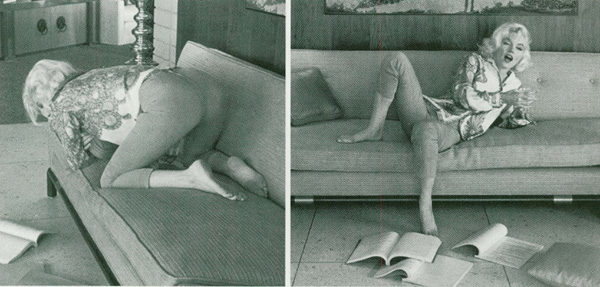
meet with Wald, who was an anomaly among Hollywood power brokers—he was happily married and not looking for sexual favors in exchange for professional opportunity. When Wald eyed the gorgeous Marilyn, he said immediately, “You are Peggy.” Marilyn cried when she got the part.
Not only did Skolsky act as Marilyn’s agent; on occasion he served as her escort to various Hollywood functions, including the 1953 Photoplay awards, where she received the Gold Medal as outstanding new actress of the year. Joan Crawford, then in her late forties, was so upset at the ceremonies by the sight of Marilyn in a shockingly low-cut gold sheath that she exclaimed to the press, “Look, there’s nothing wrong with my tits—but you will never see me flaunting them in the public’s faces.” (Crawford’s anger might have been fueled when,
office for the reading I was so nervous. My throat was dry. I had a headache and felt I’d never remember the lines. I played my scene on the floor, lying on my back, since there was no couch in the room and I didn’t want to play the scene standing. After I finished, I asked if I could do the scene again. Mr. Huston said it wasn’t necessary, but I insisted, and he let me do it once more.
When I finished the scene, he turned to me and said, “I don’t know why you had to do that scene again. You had the part the first time. But I suppose you had no way of knowing that.” And for the first time he smiled at me. He’s a genius, that man. He would let me do the scene my way and then tell me what to do to improve the scene.
The star of the film was Louis Calhern, and when the movie was released in 1950 I didn’t even appear in the screen credits. But later on, when the film was rereleased, guess what? They gave me star billing!
This was the biggest role I had then on the screen. I was finally out of the sixtysecond scenes of my previous pictures. This was my fourth motion picture, and I had a feeling now with more hard work maybe I was finding my way out of the forest.
I was still not under contract to any studio. No studio was interested enough to want to sign me until that great director and writer Joseph Mankiewicz, on the strength
according to Marilyn, she had rejected a pass Crawford had made while visiting Marilyn’s home.)
Since Sidney had never bothered to learn to drive, Marilyn often drove him to studio appointments for interviews with the stars, which seemed little enough to do for him. It became a standard laugh at Schwab’s to hear this deadpan announcement on the public address system: “Your chauffeur is here, Mr. Skolsky.”
Marilyn repaid Skolsky in yet another way for his availability and boosterism with exclusive stories about her life, and he in turn never printed anything she told him in confidence. Their attachment became so strong that Marilyn would not sign a contract or take part in a movie unless she first spoke with Sidney about it. She became close to Skolsky’s wife and daughter, too,
of my role in Asphalt Jungle, signed me for the part of the blonde called Miss Caswell in the picture All About Eve. This role was similar to the one I played in Asphalt Jungle.
I didn’t want to do the same thing, so I worked hard at developing the character the way I saw it. I had two scenes in the movie, and I had to play them with George Sanders, the film’s male star. Miss Caswell was a dumb blonde, and, though the part was a small one, when Darryl Zanuck viewed the first day’s rushes he immediately offered me a contract. I was once again back at Twentieth Century-Fox studios. I began to feel—with such great men as John Huston and Joseph Mankiewicz offering me roles, and with Darryl Zanuck’s confidence in me—I just had to work harder and harder to show others that I really wanted to be considered a serious actress.
Maybe now the studio would find the right roles for me. But once again, I was under contract and nothing was happening. They weren’t putting me into pictures. What was going to happen to my career as an actress? But that’s another story I’ll tell you later on.
and the Skolskys became her surrogate family. A rare Hollywood friendship indeed.
Lee Strasberg of the Actors Studio, her mentor and coach on the East Coast, was yet another father figure for Marilyn. She loved the Actors Studio and was excited about the private lessons she took there. Strasberg thought that, if Marilyn worked hard, she could perform credibly on the Broadway stage. She once told me that he, like Skolsky out west, had seen in her a raw but rare talent that if properly and carefully nurtured could produce a great actress. She badly wanted to deserve the faith of men like Strasberg and Skolsky.
Skolsky eventually became a film producer. Among his projects were The Eddie Cantor Story and The Al Jolson Story, and he hoped to produce The Marilyn Monroe Story, but the project was never realized.

